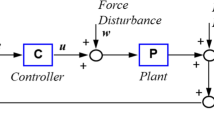Abstract
This paper presents an improved equivalent-input-disturbance (EID) approach to deal with periodic disturbances. The approach has two degrees of freedom. One is an improved EID compensator, in which a repetitive controller is inserted in this study. The other is a conventional servo system for a reference input. The improved EID compensator estimates and compensates for periodic disturbances without steady-state error, and the servo system ensures a satisfactory tracking performance. The improved EID compensator is designed using the linear-matrix-inequality (LMI) method. Three parameters in an LMI are selected using the particle-swarm-optimization (PSO) algorithm. The state-feedback gain of the conventional servo system is designed using the linear-quadratic-regulator (LQR) method. Simulation results of a rotational control system demonstrate the validity of the approach and its advantage over others.
Similar content being viewed by others
References
Lu Y S, Lin S M. Disturbance-observer-based adaptive feedforward cancellation of torque ripples in harmonic drive systems. Electr Eng, 2007, 90: 95–106
Mei C, Cherng J G, Wang Y. Active control of regenerative chatter during metal cutting process. J Manuf Sci Eng, 2006, 128: 346–349
Rech C, Pinheiro H, Grundling H A, et al. Comparison of digital control techniques with repetitive integral action for low cost PWM inverters. IEEE Trans Power Electron, 2003, 18: 401–410
Li C Y, Zhang D C, Zhuang X Y. A survey of repetitive control. In: Proceedings of IEEE/RSJ International Conference on Intelligent Robots and Systems, 2004. 1160–1166
Ma H, Li H Y, Lu R Q, et al. Adaptive event-triggered control for a class of nonlinear systems with periodic disturbances. Sci China Inf Sci, 2020, 63: 150212
Francis B A, Wonham W M. The internal model principle for linear multivariable regulators. Appl Math Optim, 1975, 2: 170–194
He J, Luo G Y, Chen J Q. Overview of repetitive control system. Appl Mech Mater, 2014, 536–537: 1174–1177
She J H, Fang M X, Ohyama Y, et al. Improving disturbance-rejection performance based on an equivalent-input-disturbance approach. IEEE Trans Ind Electron, 2008, 55: 380–389
She J H, Xin X, Pan Y D. Equivalent-input-disturbance approach-analysis and application to disturbance rejection in dual-stage feed drive control system. IEEE/ASME Trans Mechatron, 2011, 16: 330–340
Yu P, Wu M, She J H, et al. Robust tracking and disturbance rejection for linear uncertain system with unknown state delay and disturbance. IEEE/ASME Trans Mechatron, 2018, 23: 1445–1455
Liu R J, Liu G P, Wu M, et al. Disturbance rejection for time-delay systems based on the equivalent-input-disturbance approach. J Franklin Institute, 2014, 351: 3364–3377
Gao F, Wu M, She J H, et al. Delay-dependent guaranteed-cost control based on combination of Smith predictor and equivalent-input-disturbance approach. ISA Trans, 2016, 62: 215–221
Ouyang L Y, Wu M, She J H. Estimation of and compensation for unknown input nonlinearities using equivalent-input-disturbance approach. Nonlin Dyn, 2017, 88: 2161–2170
Yin X, She J H, Wu M, et al. Disturbance rejection and performance analysis for nonlinear systems based on nonlinear equivalent-input-disturbance approach. Nonlin Dyn, 2020, 100: 3497–3511
Liu R J, She J H, Wu M, et al. Robust disturbance rejection for a fractional-order system based on equivalent-input-disturbance approach. Sci China Inf Sci, 2018, 61: 070222
Yu P, Wu M, She J H, et al. An improved equivalent-input-disturbance approach for repetitive control system with state delay and disturbance. IEEE Trans Ind Electron, 2018, 65: 521–531
Wang Z W, She J H, Wang G J. Adaptive equivalent-input-disturbance approach to improving disturbance-rejection performance. Int J Autom Comput, 2020, 17: 701–712
Du Y W, Cao W H, She J H, et al. Disturbance rejection and control system design using improved equivalent input disturbance approach. IEEE Trans Ind Electron, 2020, 67: 3013–3023
Anderson B D O, Moore J B. Optimal Control—Linear Quadratic Methods. Englewood Cliffs: Prentice-Hall, 1989
Ho D W C, Lu G P. Robust stabilization for a class of discrete-time non-linear systems via output feedback: the unified LMI approach. Int J Control, 2003, 76: 105–115
Khargonekar P P, Petersen I R, Zhou K. Robust stabilization of uncertain linear systems: quadratic stabilizability and control theory. IEEE Trans Automat Contr, 1990, 35: 356–361
Gao Z Q. Active disturbance rejection control: a paradigm shift in feedback control system design. In: Proceedings of the 2006 American Control Conference, Minneapolis, 2006. 2399–2405
Acknowledgements
This work was supported in part by National Key R&D Program of China (Grant No. 2017YFB1300900), National Natural Science Foundation of China (Grant No. 61873348), Natural Science Foundation of Hubei Province, China, (Grant No. 2020CFA031), Wuhan Applied Foundational Frontier Project (Grant No. 2020010601012175), and the 111 Project (Grant No. B17040).
Author information
Authors and Affiliations
Corresponding author
Rights and permissions
About this article
Cite this article
Mei, Q., She, J., Liu, Z. et al. Estimation and compensation of periodic disturbance using internal-model-based equivalent-input-disturbance approach. Sci. China Inf. Sci. 65, 182205 (2022). https://doi.org/10.1007/s11432-020-3192-5
Received:
Revised:
Accepted:
Published:
DOI: https://doi.org/10.1007/s11432-020-3192-5




